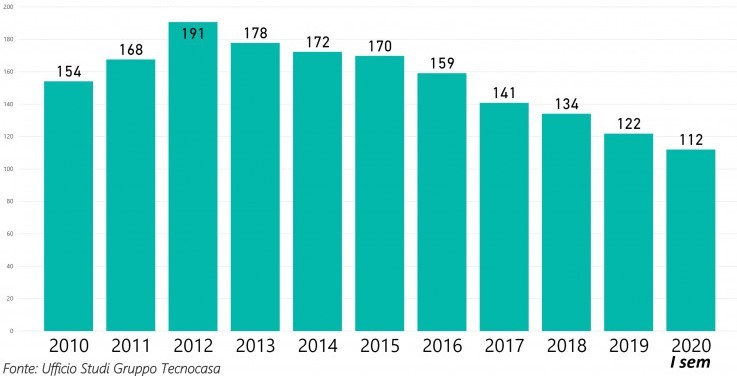
How long did it take to sell a property in Italy in 2020? According to Tecnocasa, although the arrival of the pandemic has put the property market on hold and it may not seem like the best time to buy or sell property, it does not seem to have particularly affected how long it takes to sell a house in Italy.

The time it takes to sell a property is an indicator of the health of the housing market. Its analysis, over the years, has been a real litmus test of the property market. This study, which has been carried out by the Tecnocasa Studies Office in Italy since 2010 is limited to large cities. The results highlight a peak in 2012 when it took the longest amount of time to sell a property in Italy, also rememebed as the worst year for the real estate market in Italy. The abundant supply of properties and banks more reluctant to provide credit dilated the time needed to close real estate negotiations to the maximum. However, since 2013, the number of days needed to sell a property has been steadily decreasing and houses in Italy have been spending less and less time on the market.
Taking into consideration large cities, their suburbs and provincial capitals, the figures show that, in large cities in Italy, the time needed to sell a property is 112 days compared to 122 a year ago. In the provincial capitals there is an average of 149 days, while this figure stands at an average of 154 days in the suburbs of the big cities. The latter two realities, rather surprisingly, have not recorded significant changes. Among large cities, the longest selling times in 2020 were in Bari (178 days) and Verona (142 days). On the other hand, the "fastest" cities were Milan (56 days) and Bologna (57 days).
Immediately after the spring 2020 lockdown in Italy, there was a rush to buy properties because people wanted a quick lifestyle change, buyers seeking more space and outdoor areas, amongst other elements. Potential buyers in Italy were quicker and more decisive, and, driven by the desire to buy, while sellers were more willing to accept the counterparty's proposals due to economic uncertainty caused by the pandemic, mainly driven by the fear of a further lockdown. In addition, there were also holiday home sales during the period influenced by a desire for a 'change of scenery'. These transactions also took place fairly quickly and are often carried out with equity capital.
Buyers whose income situation was not affected by the economic crisis induced by the pandemic and those for whom a better purchase could no longer be postponed were the quickest. As a seller, those who needed to change their home or who needed to find liquidity were also quicker. In a final point, the study also recognises that since September 2020, the residential housing network in Italy has been slowing down and properties have been spending more time on the market.